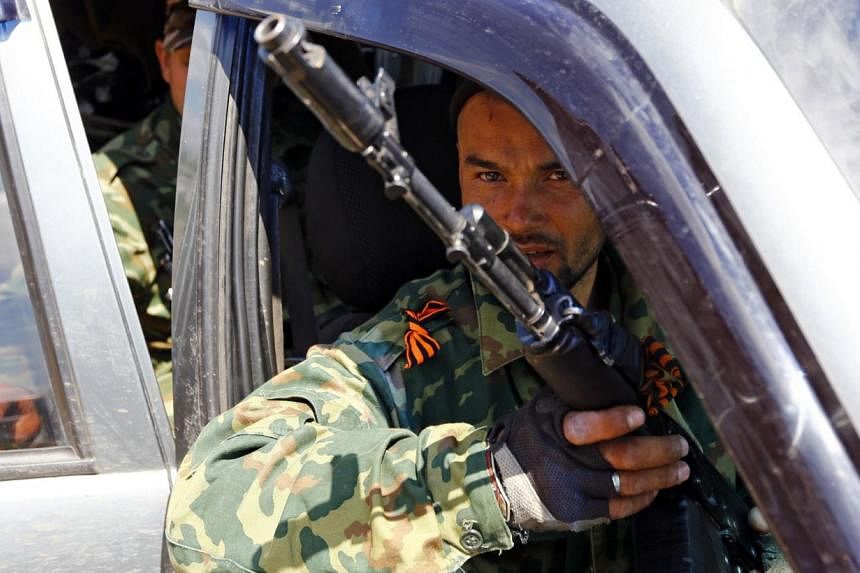KIEV (AFP) - Ukraine's new Western-backed president on Friday released a sweeping peace plan for curbing a pro-Russian uprising in the separatist east that is threatening the ex-Soviet country's survival.
The publication of the 14-point initiative followed two phone conversations in 72 hours between President Petro Poroshenko and Russia's Vladimir Putin, which highlighted the Kremlin's lingering influence over its smaller western neighbour.
Mr Poroshenko on Thursday also hosted in Kiev local leaders and tycoons from the eastern rustbelt to help win their agreement for his ideas of how to end the fighting that has killed at least 365 civilians and fighters on both sides.
A Ukranian military spokesman said on Friday the latest eastern clashes claimed the lives of seven soldiers and left 30 wounded.
Kiev media published copies of the document Mr Poroshenko was due to formally unveil later in the day that demands the rebels' immediate disarmament and promises to decentralise power through constitutional reform.
The plan also drops criminal charges against separatist fighters who committed no "serious crimes" and provides "a guaranteed corridor for Russian and Ukrainian mercenaries to leave" the conflict zone.
But it also calls on "local government bodies to resume their operations" - a demand rejected by separatist leaders who have proclaimed their independence from Kiev and occupied administration buildings in about a dozen eastern cities and towns.
One rebel commander this week dismissed news that Mr Poroshenko was about to propose a strategy for ending the country's worst crisis in its post-Soviet history as "meaningless".
The plan is officially called "Steps toward a peaceful settlement of the situation in eastern Ukrainian regions" and is intended to stay in force for 10 days after its publication.
But it makes no mention of an immediate but temporary unilateral ceasefire that Mr Poroshenko promised on Wednesday to declare within a matter of days.
Mr Poroshenko has previously suggested that his call for Ukranian forces to halt their offensive would go into effect with the plans' publication.
Mr Putin had earlier bowed to Western pressure and refused to recognise the independence proclaimed by the eastern Donetsk and Lugansk regions in the wake of disputed May 11 sovereignty referendums.
But he has lobbied heavily for Kiev to turn Ukraine into a federation that provides regional leaders with the right to draft their own laws and established independent trade relations with nations such as Russia.
The new pro-EU leaders that rose to power after months of deadly protests toppled Russian-backed president Viktor Yanukovych in February have faced similar pressure from Western leaders.
But Washington and the European Union have stopped short of supporting the "federalisation" idea promoted by Mr Putin and the regional rights outlined in Mr Poroshenko's proposal were limited.
It guarantees the "protection of the Russian language" in eastern regions and obliges the President to consult local leaders about whom he should appoint as governor.
But it does not give regions the right to elect their own heads of administration - another key Russian demand.
Mr Putin's official reaction to details of the plan Mr Poroshenko outlined by telephone late on Thursday has been muted.
"Poroshenko informed the Russian head of state regarding the main points of his plan to regulate the situation in south-east Ukraine," the Kremlin said in a statement.
It added that Mr Putin gave "a series of comments" and stressed the need for the "immediate end to the military operation".
Mr Poroshenko's office said the Ukrainian leader - elected in snap May 25 polls that gave him a convincing first-round victory against several pro-Russian rivals - told Mr Putin that he "counts on (his) support of the peace plan".
Nato on Thursday reported another unannounced build-up of Russian forces near the Ukrainian border that the Western military alliance's chief Anders Fogh Rasmussen called "a very regrettable step backwards".
Mr Rasmussen said the Russian military had deployed "at least a few thousand more" troops in what appeared to be a reversal of the pullback Moscow had begun at the start of the month.
Russian central military district commander Yaroslav Roshchupkin confirmed on Friday that "some motorised and air defence groups located in the Urals and western Siberia have been suddenly alerted and have begun multi-kilometre marches."
Mr Poroshenko for his part vowed to sign on June 27 in Brussels the economic portion of a key EU pact whose rejection by Yanukovych in November sparked the initial protests.

